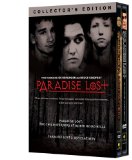| Reviews & Columns |
|
Reviews DVD TV on DVD Blu-ray 4K UHD International DVDs In Theaters Reviews by Studio Video Games Features Collector Series DVDs Easter Egg Database Interviews DVD Talk Radio Feature Articles Columns Anime Talk DVD Savant Horror DVDs The M.O.D. Squad Art House HD Talk Silent DVD
|
DVD Talk Forum |
|
|
| Resources |
|
DVD Price Search Customer Service #'s RCE Info Links |
|
Columns
|
|
|
Paradise Lost Collection, The
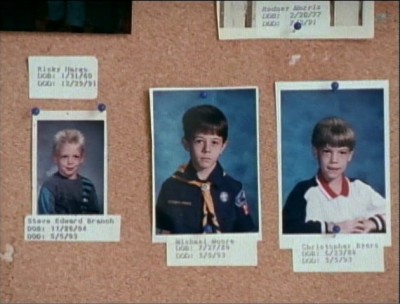
Suspicion fell immediately on Damien Echols, an 18-year-old high school dropout with a reputation as a Satanist and a history of mental illness and petty crime. Echols was interviewed repeatedly by the local police throughout the month of May, though no records were made of the interrogations. On June 3, Jessie Misskelley, a 17-year-old acquaintance of Echols with an IQ of 72 (borderline mentally retarded), was interrogated for twelve hours by police without the presence of an attorney or a guardian. At the end of the interrogation, Jessie confessed to participating in the murders and named Damien Echols and 16-year-old Jason Baldwin as accomplices. No notes were made during the lengthy interrogation leading up to the recorded confession.
Echols, Baldwin and Misskelley were charged with murder. Tried separately, Misskelly was found guilty and sentenced to life plus 40 years, despite the fact that there was no other evidence linking him to the children, substantial factual errors in the confession, and expert testimony suggesting that the dim-witted and suggestible Misskelley had been psychologically coerced into making a false statement.
Misskelley was offered a substantially reduced sentence in exchange for his testimony against Echols and Baldwin, but he refused on grounds that the prior confession was untrue. Though there was some inconclusive fiber evidence linking Echols and Baldwin with the scene of the crime (only addressed in passsing in the documentary), the crux of the prosecution's case against Echols and Baldwin consisted of alleged self-incriminating statements regarding the crimes and Echols' fascination with the occult. Despite the introduction of exculpatory evidence suggesting the crime may have been carried out by either a vagabond or Christopher Byers' stepfather, Baldwin was sentenced to life without the possibility of parole and Echols was sentenced to death by lethal injection.
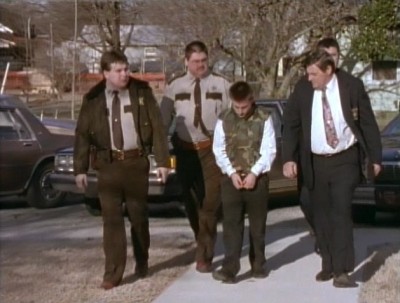
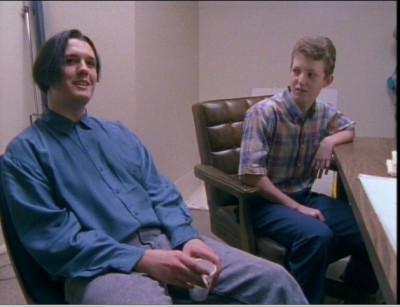
Sensationalized by local authorities and media as a shocking satanic triple murder, the prosecution of Misskelley, Echols, Baldwin, collectively referred to in the press as the West Memphis Three, grabbed national media attention. Filmmakers Joe Berlinger and Bruce Sinofsky, who had previously collaborated on the remarkable documentary Brother's Keeper about an illiterate bumpkin prosecuted for his brother's murder, were given extraordinary access to the trials and the principal figures in the case.
Told without narration and with minimal intertitles, the two-and-a-half hour, made-for-HBO documentary Paradise Lost: The Child Murders at Robin Hood Hills includes 16mm footage recorded with the judge, prosecutors, defense counsel, investigators, the victims' families, and the accused and their families, along with video from the trial, police records, and the media.
The video and photographic evidence of the crime scenes and autopsies included in Paradise Lost is extremely graphic, but nearly as startling is the behavior of many of the participants on camera. Just days after the murder of her son Steven Branch, Pam Hobbs is absolutely giddy to be interviewed by a moronic television reporter who asks her if she'd considered suicide. Echols comes off as smug and dishonest when he takes the stand in his own defense, and later remarks that he hopes to be remembered as the West Memphis Boogyman. Yet, the most disturbing performance comes from Mark Byers who creepily delivers rehearsed lines about his sorrow at his stepson's graveside and stale monologues about his thirst for vengeance while target shooting.
Paradise Lost: The Child Murders at Robin Hood Hills was a critical success for its filmmakers earning several awards including an Emmy, and a ratings success for HBO, airing frequently in 1996, and repeatedly thereafter.
Five years after the convictions of the West Memphis Three, filmmakers Joe Berlinger and Bruce Sinofsky returned to West Memphis to make a follow up documentary for HBO. Denied access to the courtroom this time, the filmmakers devoted their attention to the pro bono work being done on behalf of the convicted both in the courts and on the media front on the one hand, and the increasingly bizarre and disturbing behavior by Mark Byers on the other.
Where Paradise Lost: The Child Murders at Robin Hood Hills was responsible filmmaking that strived to be objective, the follow-up Paradise Lost: Revelations was polemic advocacy on behalf of the West Memphis Three. Though it remained narration-free, it's obvious that the filmmakers believed not only that the West Memphis Three were wrongfully convicted, but also that Mark Byers was probably guilty. The new exculpatory evidence on behalf of the three is fairly slight amounting to little more than some possible human bite marks on one of the victims that may have been overlooked during the autopsy, yet Berlinger and Sinofsky bore in relentlessly on the character of Mark Byers.
Though the parents of murder victims Steven Branch and Michael Moore declined to participate in Paradise Lost: Revelations, the filmmakers did obtain the paid participation of Mark Byers. From him and others we learn that his wife died under mysterious circumstances following the completion of the first film, that he suffers from a brain tumor and mental illness, that he's had numerous run-ins with the law for burglary, writing bad checks and DWI, that he facilitated a knife fight among minors, that he beat a neighbor's child with a belt, and that he had all his teeth removed for reasons not satisfactorily explained. Byers also provides plenty more creepily rehearsed statements of anguish and anger and associated stunts such as arson. Intertitles prior to the credits also reveal that Byers was subsequently sentenced to eight years for selling prescription drugs to an undercover police officer.
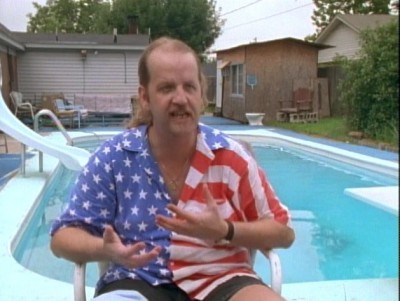
The filmmakers also managed to secure very brief interviews with the West Memphis Three. Jessie Misskelley and Jason Baldwin seem much as they had five years earlier: sweet and simple, and shy and ordinary, respectively. Damien Echols, however, appears to have matured significantly during his years on death row. Cocky arrogance has given way to thoughtful self-assurance. He regrets his boast of wanting to be remembered as the West Memphis boogyman and hopes now to just live an ordinary life someday.
Presentation
The Paradise Lost Collection from Docurama consists of the individual DVD releases of Paradise Lost: The Child Murders at Robin Hood Hills and Paradise Lost: Revelations packaged together in a cardboard case at a significant discount over purchasing the titles individually.
Video:
Composed of 16mm film and SD video footage (1.33:1 aspect ratio throughout), these films don't look very good. The interlaced image suffers from washed-out colors, color bleed, moiré patterns, motion blur, softness, age and other problems. In addition to the poor image quality of the source material, Paradise Lost: The Child Murders at Robin Hood Hills suffers from a flawed layer-change in which a minute of material from the end of the first layer is repeated at the beginning of the second layer.
Audio:
The 2.0 DD audio on these documentaries is acceptable. Dialogue is clear, distinct and understandable, and the reproduction of the soundtrack composed of Metallica songs is competent though not dynamic.
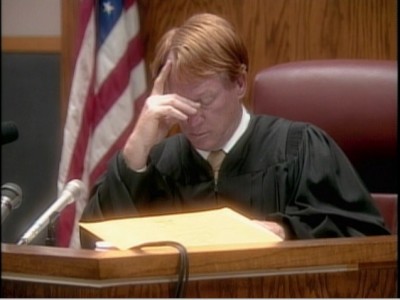
Extras:
The extras are rather meager. By far the best of the lot is about 42 minutes of trial testimony by Echols. Also included is a theatrical trailer for Paradise Lost: The Child Murders at Robin Hood Hills, a photo gallery from Paradise Lost: Revelations, a timeline and case update in PDF, filmmakers' filmographies, and trailers for other Docurama releases.
Final Thoughts:
While my preference as a viewer is to stop with the finely-crafted and mostly objective Paradise Lost: The Child Murders at Robin Hood Hills, I understand many viewers will appreciate the update provided by Paradise Lost: Revelations. For viewers that think there's never too much of a good thing, Paradise Lost 3 is now in production. On the strength of the first film and the bargain price of the set over purchasing that title alone, The Paradise Lost Collection is highly recommended.
|
| Popular Reviews |
| Sponsored Links |
|
|
| Sponsored Links |
|
|
| Release List | Reviews | Shop | Newsletter | Forum | DVD Giveaways | Blu-Ray | Advertise |
|
Copyright 2024 DVDTalk.com All Rights Reserved. Legal Info, Privacy Policy, Terms of Use,
Manage Preferences,
Your Privacy Choices | |||||||









